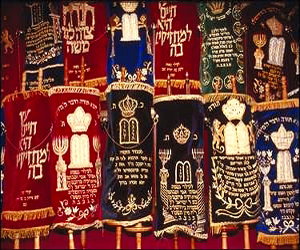Post-Passover in Tzfat
The Days Following Passover
Judaism has sometimes been referred to as a schizophrenic religion - it jumps from one extreme to another so quickly that it's hard to keep track of what is being celebrated, remembered, memorialized, commemorated, observed, marked or honored from one day to the next.
Nowhere in the Jewish calendar is this more apparent than in the weeks following Passover. Passover itself is a culmination of weeks of pressured cleaning and cooking, preparing for the seven-day festival (eight days outside of Israel) when households must be rid of all the food, crumbs, dishes and utensils from the rest of the year, and clean "Pesach utensils" and new Kosher-for-Passover food must be stocked. When the holiday finally begins, sighs of relief can be audibly heard throughout the city as residents begin a week of celebration and relaxation. And an ideal way to spend vacation time is in a Safed Passover holiday home.
The second day of Passover begins the 7-week "sephira" or counting, when Jews count the 50 days between Passover and Shavuot, between the historical Exodus of the Children of Israel from Egypt to the day when they stood at Mt. Sinai and received the Torah. This period has several days of commemoration, some of which have a very special significance for the people of Tzfat.
Days of Remembrance
The first is "Yom HaShoah", Holocaust Memorial Day. Coming one week after the end of Passover, the days leading up to Yom HaShoah are somber, as Tzfat residents who survived the Holocaust speak in schools and public forums about their experiences. On Yom HaShoah, a siren sounds at 10 a.m., which is a signal throughout the country for people to stand for 2 moments of silence of respect. Many people make an effort to come to the main street of the town, Rehov Yerusalayim, in order to stand together with other Jews at this time. When the siren goes off, everyone stops where they are, though oftentimes, one can see some of the younger people moving over to stand next to the survivors.
The scene repeats itself a week later on Memorial Day, when the country commemorates the soldiers who have given their lives during Israel's wars and struggles for survival.
First the city commemorates Tzfat Liberation Day, when the miracle of Tzfat's liberation during the War of Independence is remembered. Elderly men and women, veterans of the battles for Tzfat, make their way up to Tzfat from throughout Israel for the commemoration, and they are honored in an evening ceremony at the town's central auditorium. The names of the slain soldiers and civilians are read and memorialized, and the evening ends with the Defenders of Tzfat 1948 standing throughout the auditorium, singing their anthem.
On Memorial Day itself the main activity takes place in the military cemetery. Streams of people start moving to the cemetery from the morning hours, and at 11:00a.m., the central memorial ceremony begins - standing together in the small cemetery which borders and overlooks Tzfat's ancient cemetery are hundreds of Tzfat citizens, friends and relatives of the soldiers and civilians who died in Israel's wars. The crowd represents every facet of Israeli society.....Ultra Orthodox stand next to secular, Sepharadim (North African Jews) hug Ashkanazim (Eastern-European Jews) and the chants of prayers of remembrance are heard in a dozen accents, dialects and traditions as all Tzfat stands together in honor of these young men and women.

